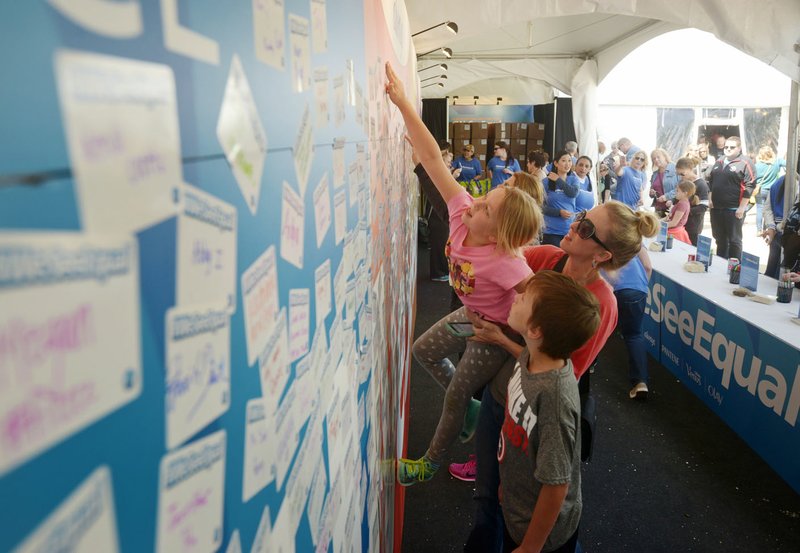BENTONVILLE -- A survey of nearly 7,000 women showed a message loud and clear. These days it's great to be a woman, but it comes with a lot of responsibility and unwanted expectations.
RELATED ARTICLE
http://www.nwaonlin…">People go to festival's Sponsor Village; schedule changes announced
"What we heard from nine out of 10 women is that it's better to be a woman now than it has ever been," said Marcela Tabares, senior vice president of strategic insights for A+E Networks, who did SheReports. The study tested how various advertising approaches affected women to learn how they respond and be able to make future messages more impactful and far reaching.
Tabares presented the findings Thursday as a panelist for "The State of Womanhood, One Woman's Empowerment is Another Woman's Burden" at the Bentonville Film Festival. A+E colleagues Joetta Gobell, vice president of primary research strategic insights, and Amy Baker, executive vice president, joined her on the panel.
Women's empowerment, fulfillment and influence over others was the focus of several events Thursday, including "In Control of Her Own Destiny" and "Gender Norms in Entertainment." The festival celebrates increasing the amount of women and diverse people who act in, direct and produce films.
"The State of Womanhood" revealed how advertisers are changing media messaging, such as commercials, to reflect the values of women, who now make up the largest share of consumers across the country.
"They acknowledge that we've come a long way, but 69 percent of women find society's expectations of them overwhelming," Tabares said. Many of the study's findings were double-edged swords. "Some of the best things about being a woman are some of the worst things about being a woman," she said.
Women in the study said the opportunity to be independent was the biggest advantage of being female in the modern age, Tabares said. Finding fulfillment as a mother or nurturer came next, followed by being the social glue of many scenarios and having the ability to express themselves both through outward appearance and with emotional intelligence.
"What we've heard in all these themes is that 'I like the option, love having the ability, but I hate the expectation,'" Tabares said.
Perhaps the most surprising finding was a high rate of sexual harassment. Over the course of the two-week survey, more than 150 instances were reported in a variety of workplace sexism, sexual harassment and physical vulnerability. Tabares said the vast majority of women responded with passive acceptance, but most women expressed a desire to do something about it. A+E used that information to ask women to submit photos of how they would like to be portrayed, images that get to the root of their values. What resulted were images illustrating strength, perseverance, a tendency to walk delicate lines, break the mold and speak up, she said.
For advertisers, the most important finding was a learning how views are divided.
"We thought differences would be along demographic lines, but what we found the most consistently differentiating was political leaning," Gobell said. "Thoughts on care, fairness, authority, loyalty and sanctity reflected differences in moral understanding."
Knowing that changes the makeup of commercials entirely, Gobell said. SheReports helped A+E understand women are more sensitive to expectations challenging their moral or political perspectives and how women go about dealing with the negative stereotypes they're faced with.
"We asked them, 'Do you see yourself reflected in media?' and only 6 percent of women agreed," Gobell said. The nuances of the research helped the company understand that most women more strongly identify with those beliefs than they do with other things that make up identity, such as race.
One thing most women surveyed could agree on was appreciation for the depiction of diverse body types. Panelists showed a variety of commercials to illustrate how they might target a conservative female audience rather than a liberal one.
"So if brands want to speak to the complex experience of womanhood, they should depict any change in gender roles as matter-of-fact," Gobell said. "They should adopt an inclusive point of view that subtly celebrates differences of all kinds and highlights female strength."
"In Control of Her Own Destiny" brought together Academy Award-winning actress Geena Davis, Grammy nominated singer-songwriter Jewel, actress Judy Greer, supermodel Emme, and Pam Kaufman, chief marketing officer of Nickelodeon, to discuss the pivotal moments that catapulted their careers.
Davis partnered with Trevor Drinkwater, chief executive officer of ARC Entertainment, to create the Bentonville Film Festival.
The panelists shared various anecdotes for breaking into the entertainment business and how they moved past the traditional gender roles of society.
Davis said she was at a loss for how to become an actress so she first pursued a modeling career, which at the time seemed easier. After landing on a cover for New Jersey Monthly, Davis finally had enough work to be able to make her own schedule.
"I would get dressed up, get on the subway and felt in charge of my schedule," she said.
Greer said her pivotal moment was similar. Once she had more than one job offer to choose from, she felt empowered. During that first crossroads Greer chose a pilot episode that didn't get picked up, but having the choice was an important beginning, she said.
Jewel recounted her experiences of being raised in Alaska, where women were expected to chop logs for houses, shoe horses and work cattle.
"We were raised doing everything men did, so I never knew my brain had a sex," Jewel said. "I could rely on myself because that was the culture, to take charge and do my own thing, to make decisions based on what I think is right."
Body positive supermodel Emme recalled a photo shoot she did in 1993 in which the photographer took one look at her and said he refused to shoot the "fatty." Emme said she had to fight for the shoot to get completed. When she ran into the same photographer four years later, he seemed to have forgotten the incident and asked for the chance to do a photo shoot with her.
"It taught me that the bully comes to the table with all these preconceived notions," Emme said. "I realized then that I could never give up or I wouldn't have this beautiful career that I love so much."
NW News on 05/05/2017



